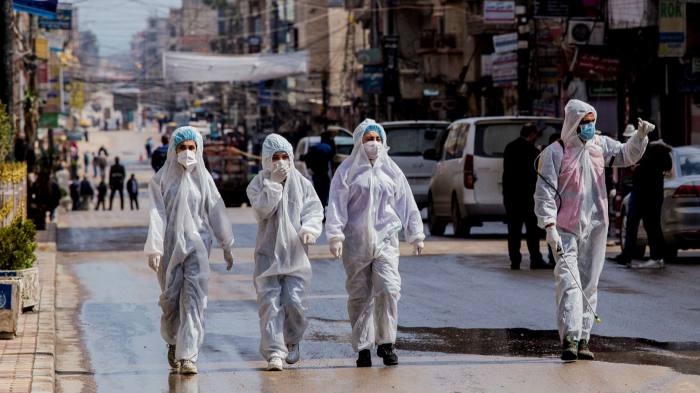On Monday, local news pages mourned the loss of a doctor from Damascus, who died of the coronavirus.
The Sama’t Hakim team shared on its page that Dr. Muhammad Darwish Mustafa, head of the medical complex in Dahiet al-Assad, had died of complications from the virus.
Mustafa, a specialist in orthopedic surgery, who contracted the virus a few days ago, marks the fortieth victim among the medical staff in Damascus.
Two days ago, the Syria Doctors Network network published a list of the names of 59 doctors and pharmacists, all of whom have died of the coronavirus since the outbreak begun in Syria.
The Sowt Al-Asima website said that hundreds of requests have been coming in daily, including from friends and acquaintances, laboratories, and requests placed through social media by residents of the capital Damascus and its countryside to obtain oxygen cylinders and home ventilators. Those people need to provide care for their family members who are battling the virus, especially after government hospitals stopped taking in these cases, and instead recommending they self-quarantine and stay at home.
As soon as the number of coronavirus infections began to rise exponentially, the oxygen cylinders and ventilators were lost from the market, medical centers and pharmacies. Ventilators became a monopolized commodity, a profitable business, akin to basic essentials that had become in high demand and whose availability in the market was controlled by merchants.
One of the most prominent dignitaries of the town of Assal al-Ward in western Qalamoun in rural Damascus died on Tuesday, of the novel coronavirus. Townspeople mourned the death of Dr. Ahmed Melhem Abu Daher, who is originally from Assal al-Ward and is a faculty member at the Faculty of Sharia at Damascus University. He died in the Mouwasat Hospital in Damascus, to which he had been transferred a few days ago.
Damascus University announced that a number of faculty members have passed away, in addition to the number of people who contracted the virus and recovered. Pro-regime newspaper Al-Watan said that the number of deaths among the teaching staff from various faculties of the university is 13, the largest part of them are affiliated with the Faculty of Medicine and their number is four, in addition to two cases in the College of Science, one death in dentistry, and the same in the faculties of pharmacy, arts and humanities, law, agriculture, and civil engineering, according to a statement by the Vice President for Administrative Affairs, Subhi al-Bahri.
Pro-regime website Syria Scope said that the death rate in Damascus has decreased over the past ten days to less than half, which gives a clear indication of the decline in deaths due to the coronavirus.
A medical source said that the daily rate of deaths in Damascus rose during Eid and the period preceding it to reach 100 deaths per day, compared to a maximum of 50 deaths per day now, pointing out that the daily death rate in Damascus before the pandemic was between 25-35 deaths per day.
The decrease in the death rate is linked to the decrease in the number of injuries, as the epidemiologist Ali Rustom, who works at Mouwasat Hospital, confirmed. He said that recent days have witnessed a clear decline in the number of injuries in Damascus, pointing out that he noticed this through the decline in the number of cases visiting the hospital.
According to Rustom, “The highest number of infections was in the week before Eid al-Adha and the week of Eid, the isolation section was full, and patients were in the emergency department, which had reached full capacity, and people were waiting for bed be vacated. However, today, we have seven vacant beds in the department, and this is a good sign.”
This article was translated and edited by The Syrian Observer. The Syrian Observer has not verified the content of this story. Responsibility for the information and views set out in this article lies entirely with the author.


